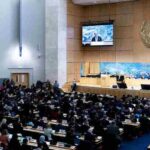
To meet the global challenge of a warming planet, the world needs to work together. Trade wars will only slow the path to net zero.
In a world divided by great power conflict, economic decoupling, high inflation and concerns that the interests of capital are being put before workers, an obvious enemy may emerge: technology. The best way to preserve the status quo is to destroy the machinery that promises a change in existing methods.
This was the thinking of the Luddites, a movement of textile workers in early 19th century England. Dismayed by trade embargoes and the financial crisis of the Napoleonic Wars, they destroyed power looms and weaving structures, hoping to slow the wave of innovation that they considered was undermining their livelihoods.
It is an example with worrying parallels to the present. China’s growing leadership in clean technology, along with its vast trade surplus and Beijing’s desire to export its way out of a domestic recession, are combining with faltering decarbonization efforts in developed countries to produce a toxic mix.
If green technology, such as electric vehicles, solar panels and home batteries, is considered foreign and threatening and is excluded through tariff laws and policies, then drastically falling costs will not be enough to get it into the hands of consumers. Spurious national security and industrial policy concerns will be enough to ban it.
We are already seeing evidence of this on several continents. Local content requirements and tariff barriers on solar panels, designed to develop domestic manufacturing industries, have functioned in many places (including India, the US, South Africa and Indonesia) as soft bans that have increased costs, slowed implementations and favored existing energy generation and emissions from fossil fuels.
The European Union, which does not impose tariffs on photovoltaic imports, installed almost twice as much solar energy last year as the US, and more than seven times as much as India, despite the climate being much less suitable for the technology.
Electric vehicles appear to be the next front in this conflict. China’s shift from one of the world’s biggest car importers to one of its biggest exporters has worried its trading partners. Most of the export effort to date has come from conventional automobiles, but China’s innovative technological advantage in electric vehicles has put electric models in the spotlight.

So far, the outrage has been fairly muted. The 25% tariffs imposed by the Trump administration mean that few Chinese vehicles appear on US roads anyway, and in Europe they are not yet a dominant presence. However, Brussels last October announced an investigation into whether Chinese cars had benefited from unfair subsidies, and the White House last month launched an inquiry into Chinese technology in “connected vehicles,” a category that encompasses both electric cars and many conventional ones.
With European and North American automakers slowing their decarbonization goals and falling battery metal prices likely pushing Chinese EVs well below the cost of conventional cars, the perceived threat of cheaper imported cars, cleaner and better quality will only increase.
“Imagine if there were thousands or hundreds of thousands of China-connected vehicles on American roads that could be immediately and simultaneously disabled by someone in Beijing,” US Commerce Secretary Gina Raimondo said in February.

This Red Dawn scenario seems strangely fixated on cars, when you consider that about 60% of the cell phones with sensors that the US has imported in the last decade were made in China, rising to about 90% when you include those made in Mexico and Mexico. Southeast. Asian countries that are typically used as clandestine trade routes.
This trajectory could become much darker if this year’s elections replace the centrist administrations of presidents Ursula von der Leyen in Brussels and Joe Biden in Washington with more nativist and protectionist politicians. As we’ve seen in Japan, South Africa and India, small tweaks to obscure regulations can be remarkably effective in putting the brakes on clean technology.
This suggests there is still scope for right-wing populists to experiment with more draconian anti-green legislation than the largely rhetorical opposition practiced by the Trump administration and UK Prime Minister Rishi Sunak.

Both sides in the trade conflict can do things to avoid this fate.
Developed countries need to eliminate the bureaucracy that impedes their ambitious decarbonization plans and offer more support for the search for green technologies. Manufacturers reasonably suspect that decarbonization targets will be abandoned when the going gets tough, so don’t invest as aggressively as Chinese competitors convinced they have state support. The result is ever-increasing Chinese dominance.
They also need to remember that what they have right now is not energy security. Raimondo’s nightmarish vision of foreign authoritarians wreaking havoc on transportation networks needs no secret switches. Oil exporters already have enough influence in energy markets to increase costs to industries and households to devastating levels. Beijing can’t stop the sun from shining on Chinese-made solar panels in Germany – but Moscow has actually cut off the flow of gas to Europe.
China, for its part, needs to recognize that it cannot export its way out of its current economic problems – and that attempts to do so will only accelerate the protectionist currents that are strengthening every day in its trading partners. A push towards greater household consumption, rather than another export boom, is the best way to rebalance its economy.
To address the common global challenge of a warming planet, all parts of the world need to work in unison. An acceleration in trade wars will only delay our path to zero.
Text by David Fickling, Bloomberg Opinion columnist covering energy and commodities. Previously, he worked for Bloomberg News, the Wall Street Journal and the Financial Times.
Source: https://www.ocafezinho.com/2024/05/12/proibicoes-de-carros-eletricos-e-paineis-solares-nao-e-tao-inacreditavel/

